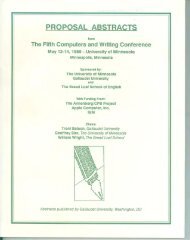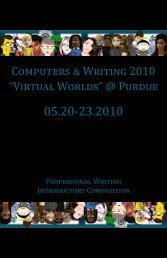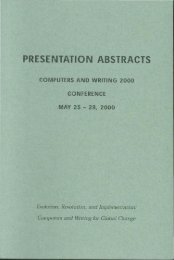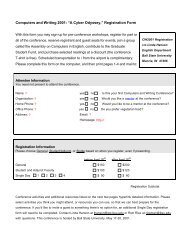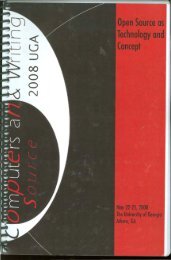CW2001 Program - Computers and Writing
CW2001 Program - Computers and Writing
CW2001 Program - Computers and Writing
You also want an ePaper? Increase the reach of your titles
YUMPU automatically turns print PDFs into web optimized ePapers that Google loves.
Friday<br />
2:15 — 3:30 Session C.1<br />
Artificial Intelligence:<br />
Cultural Perceptions, History, Theory, <strong>and</strong> Practice<br />
RB 105<br />
Cynthia Jeney, moderator<br />
Cynthia Jeney<br />
Back When the Future Was Easy<br />
Can we really build a machine capable of human language Can<br />
we learn to work with machines that seem to mimic our language <strong>and</strong><br />
thought patterns Or is AI a blind alley, just another bundle of misconceptions<br />
<strong>and</strong> wrong assumptions along the way to computational Utopia<br />
Kate Coffield<br />
The Wine is Good, But the Meat is Rotten<br />
I explore the history of Artificial Intelligence research in natural language<br />
processing (post-WWII through 1984) <strong>and</strong> observe how what was thought<br />
to be one of the simplest problems of AI quickly turned into one of the<br />
most challenging <strong>and</strong> problematic. Conclusions focus on the limitations<br />
of analytical formal systems in performance models, observing that<br />
today, computer grammar checkers still don’t “work,” <strong>and</strong> natural language<br />
instruction still tends to emphasize form over content, context,<br />
<strong>and</strong> common sense.<br />
Andrew Lee<br />
How Artificial is Artificial Intelligence<br />
I question whether AI systems can really be described as intelligent,<br />
based on an analysis of how some of these systems work. Two issues<br />
arise from this exploration: Is the mimicry of intelligence sufficiently<br />
acceptable as intelligence And could a framework in which the<br />
disparate AI solutions can be combined produce the Holy Grail of<br />
Artificial Intelligence — the sentient machine<br />
Robert Royar<br />
The Artifice of AI in <strong>Writing</strong> Instruction<br />
I focus on implications of AI in the teaching of writing. Artificial Intelligence<br />
has largely failed to live up to the potential ascribed to it in the 1970s <strong>and</strong><br />
1980s. This presentation focuses on the idea that, at least as far as writing<br />
instruction is concerned, some of that potential may be recovered by our<br />
rethinking our initial concepts regarding AI.<br />
42 <strong>Computers</strong> & <strong>Writing</strong> 2001



